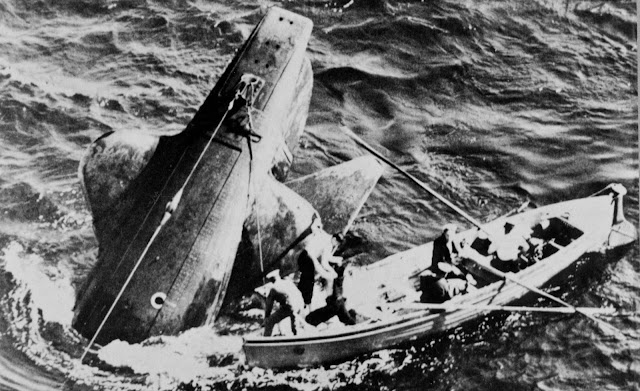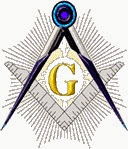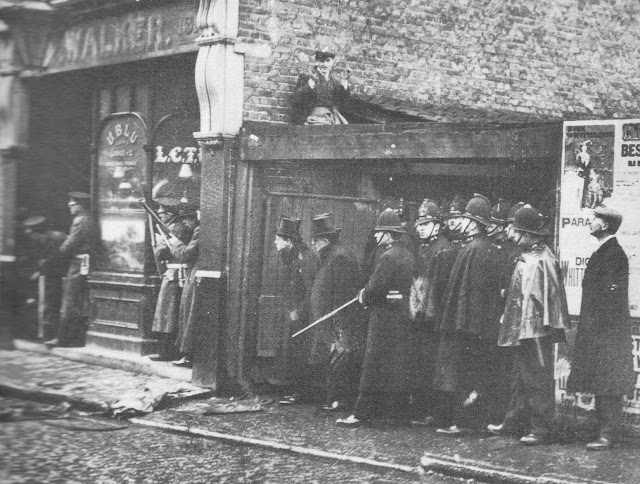The seven liberal arts and sciences were broken into two groups. One concerning language and the other concerning mathematics.
The first was the "Trivium" or road of three paths and included grammar, rhetoric and logic. Grammar is that portion of language that allows us to fine tune our speech like the ashlars and remove all barbarous expressions. Rhetoric is the art, which allows us to persuade and have an effect upon the listener. The last and perhaps most important art of the Trivium is logic, which permits us the gift of reasoning. In a purely Masonic sense it allows us to understand our duties to God and towards each other.
The second was the "Quadrivium" or path of four roads and included arithmetic, geometry, music and astronomy. Arithmetic is the process by which we are able to calculate all weights and measures, but in a speculative and philosophical sense can be best summed up by the following quotation:
"For the Freemason, the application of this science is that he is continually to add to his knowledge, never to subtract anything from the character of his neighbor, to multiply his benevolence to his fellow-creatures, and to divide his means with those in need."
From Mackey's Masonic Encyclopedia
Geometry is so fundamentally a part of Freemasonry as to almost require no explanation, suffice to say it is the science upon which our very fraternity is founded. It allows us to create right angled triangles, the symbol of our uprightness and square actions towards God, one another and our fellow creatures.
Music is a mystery to the Freemason and a mystery as to its connection to mathematics, but as anyone, who practices this art, the connection is apparent. Our ancient brother Pythagoras was perhaps the first to notice the mathematical correlation between music and numbers.
Astronomy is that art by which we can trace the great symmetry of the hand of the deity throughout the heavens. Many of our symbols, the sun, the moon the stars are borrowed from the science of astronomy.
While to our ancient brethren aimed at a blending of all knowledge, the modern freemason can apply to the seven liberal arts and sciences a special and appropriate metaphor for a life of self-improvement and mental growth. This goal is symbolized in our lodges by the rough and perfect ashlars and by the Masonic agenda of taking a good man and making him better.
-Source: Stephen Dafoe - Site Owner
LIBERAL ARTS AND SCIENCES
In the Ancient world the Liberal Arts and Sciences consisted of grammar, rhetoric, dialectic, arithmetic, geometry, music, astronomy; at least, the standard histories of education thus list them, though it is doubtful if Greek and Roman Schools rigidly adhered to that list or to its nomenclature-the Athenian schools of a certainty did not, because Aristotle and his successors taught zoology; neither did the schools and universities which were built in Europe after Charlemagne for the university at Salerno specialized in botany; the one at Cologne, in stenography and bookkeeping; one at Paris in law; etc.
The Medieval Freemasons were so devoted to the Liberal Arts and Sciences that w hen the author of the first of the Old Charges east about among the pages of the polycronicons or histories of the world then being circulated in MS. form for the grounds on which a Charter had been given to the Fraternity, he gave prominence to an old legend about two pillars on which the "secrets" of the Arts and Sciences had been preserved through Noah's Flood. This close and boasted connection between Operative Freemasons and the Arts and Sciences has long been a puzzle. Masons did not teach their apprentices each of the seven subjects. Why should a Craft of workmen boast of possessing u hat belonged to a few universities?
Nevertheless they did boast, and because they did, they considered themselves apart and above the populace, which was illiterate. Even the clergy was uneducated? And among the prelates only a few could read and write. The majority of the kings, princes, and upper nobility knew so little about books or studies that they almost knew nothing; even as late as 1700 Louis XIV of France, the Sun King, the Grand Monarch, could only with great labor sign his name or spell out a few sentences.
The answer to the puzzle is that the Gothic Freemasons who built the cathedrals, priories, abbeys, etc., practiced an art which of itself required an education; education was an integral part of it. To be such a Freemason was to be an educated man. Thus the connection between Freemasonry and the Arts and Sciences was not a factitious one, but a necessary one. In a period without schools an education could not be called schooling, college or university; it was called the Liberal Arts and Sciences. Since the Freemasons employed the phrase merely as a name for education, the fact that the classical curriculum had consisted of seven subjects is irrelevant to their history, and has no significance for interpretation of the Ritual.
After the system of Speculative Freemasonry was established in the Eighteenth Century the emphasis on education as not only retained but was magnified, and it was called by its old name. The two pillars mere retained; a prominent place was given to the Arts and Sciences in both the Esoteric and the Exoteric portions of the Second Degree. Twentieth Century Freemasons feel as by a kind of instinct that education inevitably and naturally is one of their concerns; they take the motto, "Let there be light," with seriousness and earnestness.
This is a striking fact, this continuous emphasis on education by the same Fraternity through eight or nine centuries of time! The memory of that long tradition, the sense of continuing now what has been practiced for so long, is alive in the Masonic consciousness. Masons have seen education persist through social, religious, political revolutions, from one language to another, from one country to another; they are therefore indifferent to the labels by which education is named (else they would substitute "education" for "Liberal Arts and Sciences"), and they are likely to believe, as against pedagogic experimentalists and innovators, that the imperishable identity and long-continued practice of education means that at bottom there is the curriculum, not countless possible curricula; and that it universally consists of the language, as it is written or spoken and is its structure, of mathematics, of history, of science, and of literature; an apprentice in life must begin with these; what else he learns in addition is determined by what art, trade, or vocation he is to enter.
The fact that education belongs essentially to the nature of Freemasonry and ever has, possesses a critical importance for the history of the Craft; is one of the facts by which the central problem of that history can be solved. There were hundreds of crafts gilds, fraternities, societies, skilled trades in the Middle Ages; a few of them were larger, more powerful, and far more wealthy than the Mason Craft, and they also had legends, traditions, officers, rules and regulations, possessed charters, took oaths, had ceremonies, admitted "non-operatives" to membership. Why then did Freemasonry stand aside and apart from the others? Why did it alone survive the others? Why did not they, as well as it, and long after the Middle Ages had passed, flower into world-wide fraternities? What unique secret did Freemasonry possess that they did not? It is because it had in itself, and from the beginning, had so much for the mind; so much of the arts and sciences; its members were compelled to think and to learn as well as to use tools.
It possessed what no other Craft possessed, and which can be described by no better name than philosophy, though it is a misnomer, for the Freemasons were not theorizers but found out a whole set of truths in the process of their work; and these truths were not discovered or even guessed at by church, state, or the populace. When after 1717 the Lodges were thrown open to men of every walk and vocation, these latter discovered in the ancient Craft such a wealth of thought and learning as must ever be inexhaustible; and they have since written some tens of thousands of books about it, and have expounded it among themselves in tens of thousands of speeches and lectures. Furthermore they found that from the beginning of Masonry, education had never been considered by it to be abstract, academic, or detached, a luxury for the few, a privilege for the rich, a necessity only for one or two professions, a monopoly of the learned, and something in books; they found that education belonged to work; this connecting of education with work, this insistence that work involves education, was not dreamed of in Greece and Rome, was not seen in the Middle Ages, and would have aroused a sense of horror if it had been, and even in modern times is only beginning to be seen.
The uniqueness of this discovery explains in part the uniqueness of Freemasonry then and thereafter.
- Source: Mackey's Encyclopedia of Freemasonry



















 Judy Gibbs, a model and call girl who appeared in Penthouse magazine, runs a powerful house of prostitution in Fordyce with her sister Sharon. They also blackmail some of their more powerful clients. Both her family and one of Clinton's bodyguards will later link Judy Gibbs to the governor. She decides to cooperate with police in an investigation of Arkansas cocaine trafficking, but is burned to death inside her home from a fire of undetermined origin. In 1999, Newsmax will report, "[Former Clinton bodyguard Barry] Spivey had become something of a mystery man, who insisted on meeting [Paula Jones investigator] Rick Lambert on a deserted road nestled deep in the Arkansas backwoods. The Jones investigator admitted he was none too comfortable with the situation. Spivey shared a story about a conversation he had with Clinton while on a flight over southeast Arkansas. The trooper noticed a blackened patch amidst the greenery below that, surprisingly, Clinton recognized. That patch was all that was left of an estate that had burned to the ground in the mid-80s. According to the trooper, Clinton began reminiscing about rumors of his involvement with the woman of the house, a onetime "Penthouse pet." Her husband, Spivey said, was involved in a pornography ring. Clinton explained to Spivey, 'You know that mansion just burned down right on top of them.' Years later, Spivey remains struck by one thing: the eerie expression that crossed Clinton's face as he spoke those words. ...."
Judy Gibbs, a model and call girl who appeared in Penthouse magazine, runs a powerful house of prostitution in Fordyce with her sister Sharon. They also blackmail some of their more powerful clients. Both her family and one of Clinton's bodyguards will later link Judy Gibbs to the governor. She decides to cooperate with police in an investigation of Arkansas cocaine trafficking, but is burned to death inside her home from a fire of undetermined origin. In 1999, Newsmax will report, "[Former Clinton bodyguard Barry] Spivey had become something of a mystery man, who insisted on meeting [Paula Jones investigator] Rick Lambert on a deserted road nestled deep in the Arkansas backwoods. The Jones investigator admitted he was none too comfortable with the situation. Spivey shared a story about a conversation he had with Clinton while on a flight over southeast Arkansas. The trooper noticed a blackened patch amidst the greenery below that, surprisingly, Clinton recognized. That patch was all that was left of an estate that had burned to the ground in the mid-80s. According to the trooper, Clinton began reminiscing about rumors of his involvement with the woman of the house, a onetime "Penthouse pet." Her husband, Spivey said, was involved in a pornography ring. Clinton explained to Spivey, 'You know that mansion just burned down right on top of them.' Years later, Spivey remains struck by one thing: the eerie expression that crossed Clinton's face as he spoke those words. ...."



